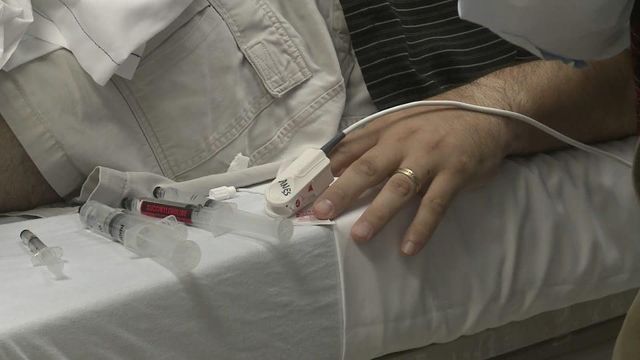Advances in shock therapy helping patients with depression
Thanks to its portrayal on the big screen, shock therapy is often associated with two things: lightning and fear.
Posted — UpdatedIn reality, shock therapy isn't nearly as dramatic or painful as movies make it appear. Advances in Electro Convulsive Therapy are helping patients battle severe depression more successfully than other medicines.
One such patient is Jim Adkins, a stay-at-home dad who has battled severe depression for 16 years.
Adkins, who's father suffered from depression until he committed suicide six years ago, said his depression has kept him from working for nearly three years.
"I kind of went into a tailspin with that, and my depression definitely grew worse," Adkins said. "I was suicidal, I attempted suicide twice."
After his symptoms worsened and his antidepressant prescriptions no longer helped him from experiencing severe episodes, Adkins turned to ECT treatments at Duke University Hospital.
Thanks to advances in the technology, Adkins' last resort turned into a success story.
"The type of ECT we use now is much safer and more effective than what we used to use," Duke psychiatrist Richard Weiner said.
By using general anesthesia and muscle relaxants, patients no longer have convulsions during treatment. Patients still have seizures when electricity is applied, but doctors say they only last about a minute.
Weiner said the impact on the brain is similar to medications, but ECT treatments are more powerful. The first treatments require three sessions per week for six to 12 weeks, and then periodic maintenance sessions.
"When it works, it brings someone out of an episode of depression where the individual is pretty much incapacitated," Weiner said.
Adkins said ECT treatments have helped him get through the darkest times of his depression, even helping him get past suicidal thoughts.
"It hasn't cured me, but it has done what medication hasn't been able to do," he said.
Doctors are generally very selective when choosing patients for ECT treatments. They look for patients who have stopped responding to medications or may be a danger to themselves.
Side effects of the treatments include nausea and headache.
• Credits
Copyright 2024 by Capitol Broadcasting Company. All rights reserved. This material may not be published, broadcast, rewritten or redistributed.






